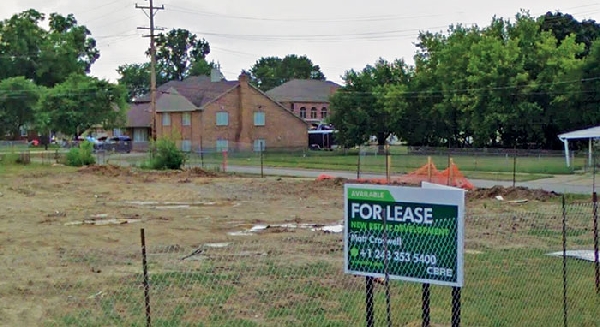
DEARBORN HEIGHTS — In May, the police department came under fire for allegedly arresting a number of Arab Americans without justification, but the city with newly built mansions dwarfing neighboring antiquated smaller homes is now being criticized by its richest residents.
Following the rezoning of a residential block on Ford Road between Inkster and N. John Daly to a commercial-residential area, homeowners living on Doxtator, a street behind the re-designated properties, say they oppose the redevelopment because the city carried it out illegally.
In March, Mohamed Sobh, the city’s building and engineering director, said the residential area will be converted into a central commercial zone, allowing a mixture of residential and commercial properties to be built. He added the commission will limit the types of business that could be erected there.
“Playing in the dark”
Sameeh Kawar, a surgeon living in a multi-million-dollar mansion on Doxtator Street, regarded as one of the richest streets in Dearborn Heights, said most of his neighbors
are very upset that businesses are being built right behind their backyards, affecting their homes’ values.
What is troubling them is that the Planning Commission, which handles rezoning and site plans, has not notified the residents of the development, he said.
The commission is required by law to mail letters to nearby residents after a rezoning has been considered, giving homeowners the opportunity to ask questions, voice concerns or object to a project before it is voted on in a City Council meeting.
Kawar said his neighbors have considered taking action against the city.
He said residents are concerned that truck traffic, pollution, noise and rats from the shops will impact their neighborhood. He added that a boost in activity could increase crime on the wealthy street and that he has a pool in his backyard, which his family will not be able to use because of privacy concerns.
However, most concerning to Kawar and his neighbors is that almost “overnight” and without notice, the city approved the rezoning, then real estate agents began buying the modest homes facing Ford Road for a cheap price and sold them to private developers for almost $1 million.
He said the residents also fear the city is making deals under the table with private developers to expedite the development process.
Construction to build these businesses has already begun.
“There’s something wrong here — something…playing in the dark,” Kawar added.
Imad Sabbagh, Kawar’s neighbor, said that while he defends the real estate agents’ rights to sell homes as part of their business, he wished he could vote against the rezoning.
This is not the first time Dearborn Heights’ residents were unable to protest a project in their town, he said.
In previous years, Sabbagh received a notice that a gas station would be built near his business. He attempted to object to it at a City Council meeting, in front of the mayor.
“They said this is what they proposed and this is what they’re gonna get,” Sabbagh said. “We went and spoke our mind and we ended up saying, ‘they’re bigger than us; they’re going to do it whether we like it or not.’ And they went ahead and did it.”
He added that he noticed the block was rezoned about four or five years ago, way before it was explicit, when he began seeing commercial trucks parked in the driveways of the houses on Ford Road.
Parking commercial trucks at residential homes is against Dearborn Heights ordinances.
Gus Mareskas, a longtime resident of Doxtator Street, said he is infuriated that his city would not consult taxpayers of a major development that will directly affect their living conditions.
“Somebody is making big dough,” he said. “Why rezone the area without asking anybody?”
By the books
Dearborn Heights Councilman Dave Abdallah, a real estate agent, said while the rezoning went into effect prior to his election, redevelopment was considered due to safety concerns. Cars backing out of the driveways leading to Ford Road could cause accidents with oncoming traffic.
For that reason, he said the city decided a mixed commercial designation was a “much more appropriate use” of the block.
As for the unusually high sale price of the homes, Abdallah said prior to the rezoning, the homes were on the market for an average of $200,000. After the rezoning, the prices almost quadrupled due, along with high demand, to great interest in opening businesses in a new strip mall and concentrated communities.
Dearborn Heights’ Mayor Dan Paletko told The AANews there was no attempt from the city to force the project on unaware residents. He said he has no evidence to believe the city is profiting from the project.
“It was natural and everybody expected at some point in time that the rest of Ford Road would turn into a commercial property,”
he added.
Paletko also said developers of the new shops were required to file permits and submit building plans that had to be approved by the city’s planning commission.
He added that one of the developers had been critical of the city for imposing strict zoning codes.
At the time of the rezoning years ago, the mayor said a notification would have been placed in a local paper.
Mareskas said such notice would have been too inconspicuous and impractical for residents to read.
According to Paletko, when the developer requested a variance in the plan in recent months that placed a condition to build the shops on the back-end of the properties, so that parking spaces were located at the front end, similar to neighboring plazas, the Zoning Board of Appeals sent out a notice to residents regarding the change.
Paletko said the city is working on getting permission to limit access to Doxtator Street for the residents’ protection.
He also said it’s his understanding that a wall or other barrier will separate the neighborhood from the businesses.
In March, the mayor said he hoped to see the area become a downtown Dearborn Heights.






Leave a Reply